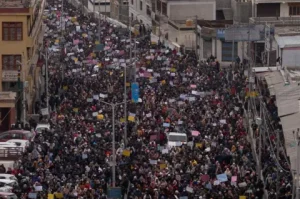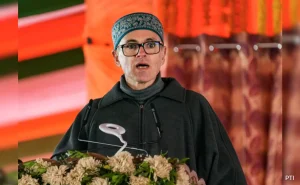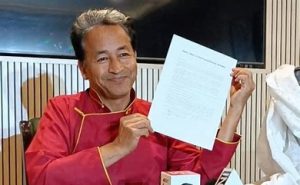Ladakh – The political storm over the violent clashes in Leh has intensified with Omar Abdullah On Ladakh Violence becoming a central talking point. The Jammu and Kashmir Chief Minister Omar Abdullah defended the Congress party after the Bharatiya Janata Party (BJP) accused it of inciting unrest. He argued that the lieutenant governor-led administration in Ladakh should focus on its own failures instead of blaming opposition parties. Abdullah stated that blaming others had become the BJP’s habitual response whenever governance lapses emerged.
Deadly Protests Shake Leh

The unrest in Leh turned deadly on September 24 when protests linked to the Ladakh statehood movement and the demand for inclusion under the Sixth Schedule of the Constitution escalated. Four people lost their lives, and over 80 were injured as mobs clashed with police and security forces. The violence also saw a BJP office and several vehicles set ablaze, intensifying the political war of words. Against this backdrop, Omar Abdullah On Ladakh Violence has gained prominence as he sought to highlight administrative failures.
Abdullah Shifts Spotlight to Governance Gaps


In his remarks, Abdullah stressed that the administration had the primary responsibility to maintain law and order. He said, “The government [in Ladakh] is theirs [BJP’s]. When they fail, they blame someone else. Had the Congress been so powerful that it could cause riots in Ladakh, why didn’t the party win the council elections in 2020? The BJP secured victory, while Congress faced defeat.” His statement reinforced the theme of Omar Abdullah On Ladakh Violence, which centered on governance accountability rather than partisan blame.
Sonam Wangchuk Backs Abdullah’s Stand


Environmental activist Sonam Wangchuk, who has himself been accused by the Ministry of Home Affairs of making provocative speeches, also supported Abdullah’s position. Wangchuk insisted that the Congress lacked the grassroots strength in Ladakh to mobilize thousands of protesters. “Congress doesn’t have such influence here that it can get 5,000 youth on the streets,” he stated. His comments further amplified the narrative of Omar Abdullah On Ladakh Violence, showing that civil society voices were also questioning the BJP’s accusations.
A Call for Peace Amid Turmoil
Abdullah, while criticizing the administration, also appealed for calm. “I would appeal to people to not take the law into their hands and follow the path of peace. The Government of India should pay attention to their legitimate demands,” he said. This aspect of Omar Abdullah On Ladakh Violence reflected his attempt to balance political criticism with a call for restraint and constructive engagement.
BJP’s Counterattack on Congress
The BJP, however, stuck to its allegations. Party spokesperson Amit Malviya shared an image of a masked man allegedly holding a weapon, claiming he was Phuntsog Stanzin Tsepag, a Congress councillor from Upper Leh Ward. Malviya asserted that Tsepag was directly instigating the mob and accused the Congress of orchestrating the violence. His post linked the unrest with the broader political ambitions of Congress leaders.
BJP MP Nishikant Dubey echoed the claim, blaming Tsepag for the arson at the BJP office. He argued that such acts exposed the Congress’s desperation and warned that “playing with fire” would have consequences. These allegations created a sharp counterpoint to Omar Abdullah On Ladakh Violence, underscoring the deep political divide.
Contesting Narratives Around Responsibility
The competing claims reveal a stark clash of narratives. On one side, Omar Abdullah On Ladakh Violence emphasizes governance accountability, highlighting the administration’s failure to prevent bloodshed. On the other, BJP leaders insist that Congress members played an active role in fuelling unrest. Wangchuk’s intervention further complicates the picture, questioning whether the Congress truly had the organizational capacity to lead such widespread protests.
Broader Implications for Ladakh Politics
The incident has reignited debates on Ladakh’s future, its governance, and the simmering demand for greater autonomy under the Sixth Schedule. Omar Abdullah On Ladakh Violence has underscored how political blame games can overshadow the core issues of representation and rights. With tensions still high, the handling of the situation could shape public opinion not just in Ladakh but across the wider region.
Conclusion
The violence in Leh has left a trail of grief, anger, and political acrimony. At the heart of the debate is Omar Abdullah On Ladakh Violence, which frames the unrest as a consequence of governance failures rather than partisan provocation. With lives lost and demands for statehood intensifying, the episode will test both the administration’s capacity to restore order and the political leadership’s willingness to address Ladakh’s grievances meaningfully.

